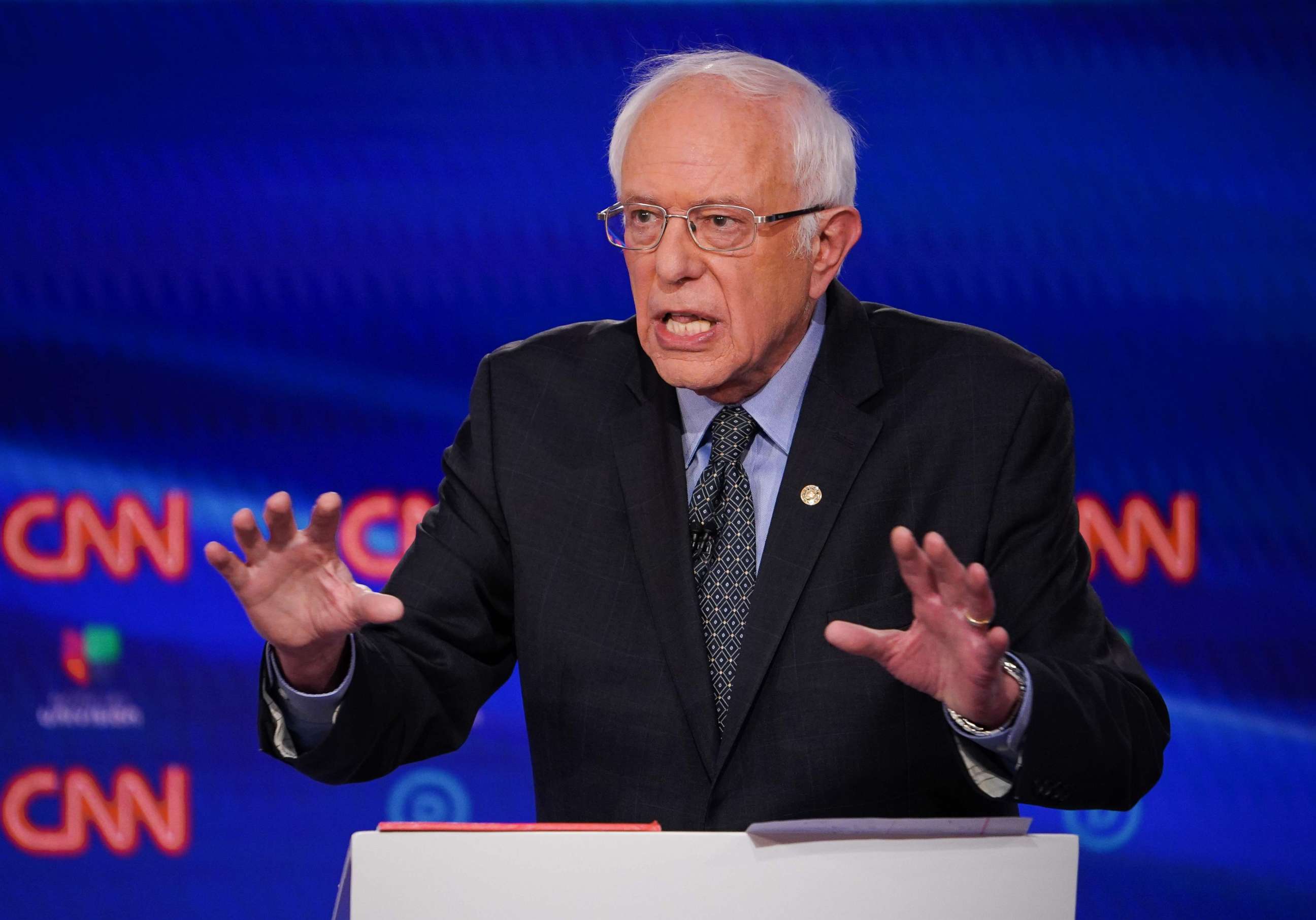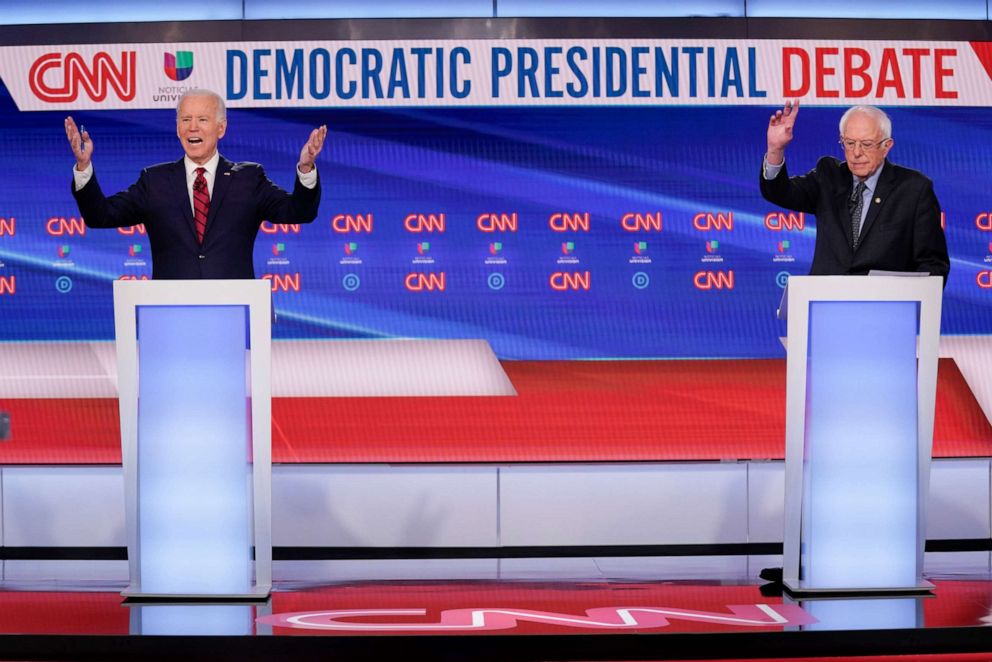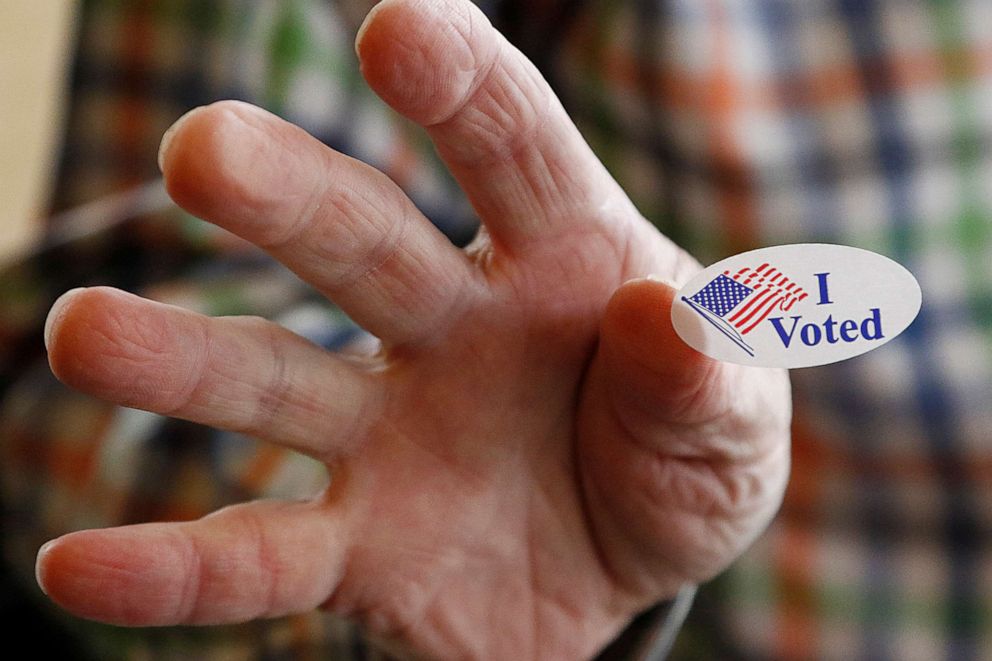The Note: Sanders digs in on coronavirus as Democratic race marches on
In the first one-on-one debate, coronavirus is the leading topic
The TAKE with Rick Klein
The national crisis and the delegate math would point toward a Democratic race that’s winding down.
Before it gets there, though, Sen. Bernie Sanders will have a whole lot more to say. Sunday night’s debate made clear that Sanders is digging in on his argument that the coronavirus outbreak is a powerful argument for his brand of economic justice and Medicare for all.
Sanders is positioned to take that fight to the Senate, where he returns to work Monday, and to what remains of the campaign, with four more big states voting Tuesday. At the debate, he signaled that he continues to see his positions as fundamental – even though former Vice President Joe Biden very much does not share them all.

“We have won some states; Joe has won some more states,” Sanders said. “But here’s what we are winning: We are winning the ideological struggle.”
A testy debate does nothing to reset the delegate math, and Biden’s substantial edge is likely to grow this week. The voting from here happens under an unusual set of circumstances that seems certain to impact turnout as well as tune-in from voters; campaigning as we’ve known it remains off the table.
But if Sanders’ policy positions aren’t central to Americans’ concerns this week, he is still in a position to make himself – and his movement – heard.
Biden came into the debate touting some moves to the left, and half-joked that Sanders is “making it hard for me right now” to reach out to progressive voters. His hope from here is that what’s hard now makes it easier later, when the time comes to unite the party.
The RUNDOWN with MaryAlice Parks
In case voters needed another reminder, the current health crisis has underscored the similar age of the candidates left in the race. During Sunday night’s debate, both Biden and Sanders were asked point-blank how they were staying safe right now. As older Americans they are most at-risk of serious complications should they contact the coronavirus.
Their age and long experience came up in other ways too. Both men ticked through each other’s past votes and statements on the Senate floor, reinforcing to the audience that neither of them has had some perfect, pure record, but that as a pair, the two of them have been working in Washington for decades.

Sanders talked at length about how he believed the Democratic Party should embrace the ideas and concerns of a younger generation of voters. Still, neither talked about the lack generational diversity left in the race.
The Vice President acknowledged the lack of gender and racial diversity though. Without hesitation or caveat, he promised his running mate would be a woman should he win the nomination, and he vowed again to appoint the first African American woman to be on Supreme Court should he win the White House too.
The TIP with Kendall Karson
The 2020 primary season will now be even longer than any candidate anticipated if it continues to be a race to a delegate majority.
On Tuesday, four states set to hold nominating contests, Arizona, Florida, Illinois and Ohio, are moving forward as planned - and by of the night just over 60% of the delegates in the entire process will be divvied up. But after Tuesday, the race that saw a crowded field winnow down to a two-person contest at the onset of the month, is coming to a near halt just two weeks later, much like 2020 campaign itself, due to anxieties over coronavirus.

Two states, and likely not the only two, Georgia and Louisiana, have postponed their presidential primaries by nearly two months in response to the global outbreak. Georgia, a state with 105 delegates and whose primary was slated for March 24, is moving to May 19, while Louisiana, the first state to reschedule, pushed its April 4 primary to allot 54 delegates to June 20, past the Democratic National Committee's June 9 deadline for when the process is supposed to be wrapped up by.
But the effect of voting delays means Biden, who is on a current winning streak since the South Carolina primary, will likely have to wait a little bit longer to amass an even greater delegate lead, and potentially lock up the nomination. Standing currently 1,150 delegates shy of the necessary 1,991, compared to Sanders' 1,301, the next shot at a big delegate prize after Tuesday won't come until the Acela primary on April 28, when more than 660 delegates are up for grabs. To clinch the top of the Democratic ticket after all those delegates are awarded, Biden will now need to earn about 69% of the remaining delegates, while Sanders needs roughly 78%.
ONE MORE THING
Tom Bossert, former homeland security adviser to Trump and current ABC News contributor, says that we must take aggressive steps against the novel coronavirus, saying "success will look like we overreacted." Read more about what Bossert describes as the coronavirus paradox.
THE PLAYLIST
ABC News' "Start Here" podcast. Monday morning’s episode features ABC News Senior National correspondent Terry Moran and ABC News Chief Medical correspondent Dr. Jennifer Ashton who discuss the response from the U.S. government to COVID-19 and how we should be altering our daily lives. Then, ABC News’ Kaitlyn Folmer tells why a ventilator shortage could be the next coronavirus crisis in this country. And, we recap Sunday night’s presidential debate between Sen. Bernie Sanders and former Vice President Joe Biden. http://apple.co/2HPocUL
WHAT YOU NEED TO KNOW TODAY
Download the ABC News app and select "The Note" as an item of interest to receive the day's sharpest political analysis every weekday.
The Note is a daily ABC News feature that highlights the key political moments of the day ahead. Please check back tomorrow for the latest.




